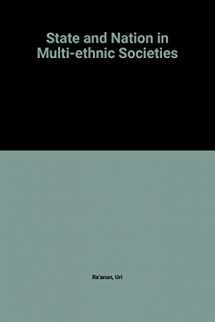
State and Nation in Multi-Ethnic Societies
ISBN-13:
9780719037115
ISBN-10:
0719037115
Author:
Uri RaAnan, Kate Martin, Marie Mesner, Keith Armes
Publication date:
1991
Publisher:
Manchester Univ Pr
Format:
Hardcover
269 pages
FREE US shipping
Book details
ISBN-13:
9780719037115
ISBN-10:
0719037115
Author:
Uri RaAnan, Kate Martin, Marie Mesner, Keith Armes
Publication date:
1991
Publisher:
Manchester Univ Pr
Format:
Hardcover
269 pages
Summary
State and Nation in Multi-Ethnic Societies (ISBN-13: 9780719037115 and ISBN-10: 0719037115), written by authors
Uri RaAnan, Kate Martin, Marie Mesner, Keith Armes, was published by Manchester Univ Pr in 1991.
With an overall rating of 3.6 stars, it's a notable title among other
books. You can easily purchase or rent State and Nation in Multi-Ethnic Societies (Hardcover) from BooksRun,
along with many other new and used
books
and textbooks.
And, if you're looking to sell your copy, our current buyback offer is $0.3.
Description
Most of the chapters of this volume are based on presentations given at the conference on "State and Nation in Multi-Ethnic societies" held in Vienna in January 1991. Wherever necessary, the contributions were revised to reflect recent developments. The idea behind the conference and the papers is: are there lessons to be drawn for contemporary multi-ethnic societies from the experience of the Austro-Hungarian monarchy in its last decades? More specifically, can some of the thinking about the relation of state and nation that occurred during that period within the ambience of Austrian Social Democracy have possible applicability today? Karl Kraus, the great Viennese satirist, called Austria-Hungary "the dress rehearsal for the apocalypse". He was more right than he could possibly have known at the time. One area in which Austria-Hungary served as a "dress rehearsal" - or, if one prefers, a prematurely ended laboratory experiment - was that of ethnic turmoil. Indeed, the two parts of the monarchy constituted a sort of controlled experiment for two very different policies regarding what was then called the "nationalities problem". The Hungarian elite understood its political entity as a modern action-state tout court, the nation in question was the Magyar nation, and other nationalities (Slavs, Germans, Rumanians) were subjected to powerful pressures (a mix of coercion and cajolery) to magyarize. By contrast, the Austrian half of the monarchy developed clearly in the directon of a multinational, multicultural political structure. It did so without a coherent theory, without political elan, in a muddle of halfhearted steps. Nevertheless, in retrospect it constituted one of the first cases of a modern state that could or can genuinely be described as a deliberately multinational policy. Nor should one too readily accept the conventional view that this experiment failed. The Austro-Hungarian state perished as a result of its defeat in a war provoked by its own disastrous foreign policy. The problems of this long-extinct state have a strikingly contemporaneous quality about them, and the idea of taking another look back is not at all outlandish. The ethnic earthquakes currently shaking the Soviet Union and the countries of East-Central Europe (many of them, of course, "successor states" of the monarchy) give an added timeliness to such an intellectual exercise. More specifically, Austrian Social Democracy (the party celebrated its 100th anniversary in 1990) was very much involved in the debates over the "nationalities problem" in the monarchy around the turn of the century. Two of its pre-eminent thinkers, Karl Renner and Otto Bauer, wrote highly influential monographs on the subject, and their ideas were embodied for a number of years in the party's programme and applied in some practical policies (notably in Moravia).


We would LOVE it if you could help us and other readers by reviewing the book
Book review

Congratulations! We have received your book review.
{user}
{createdAt}
by {truncated_author}


